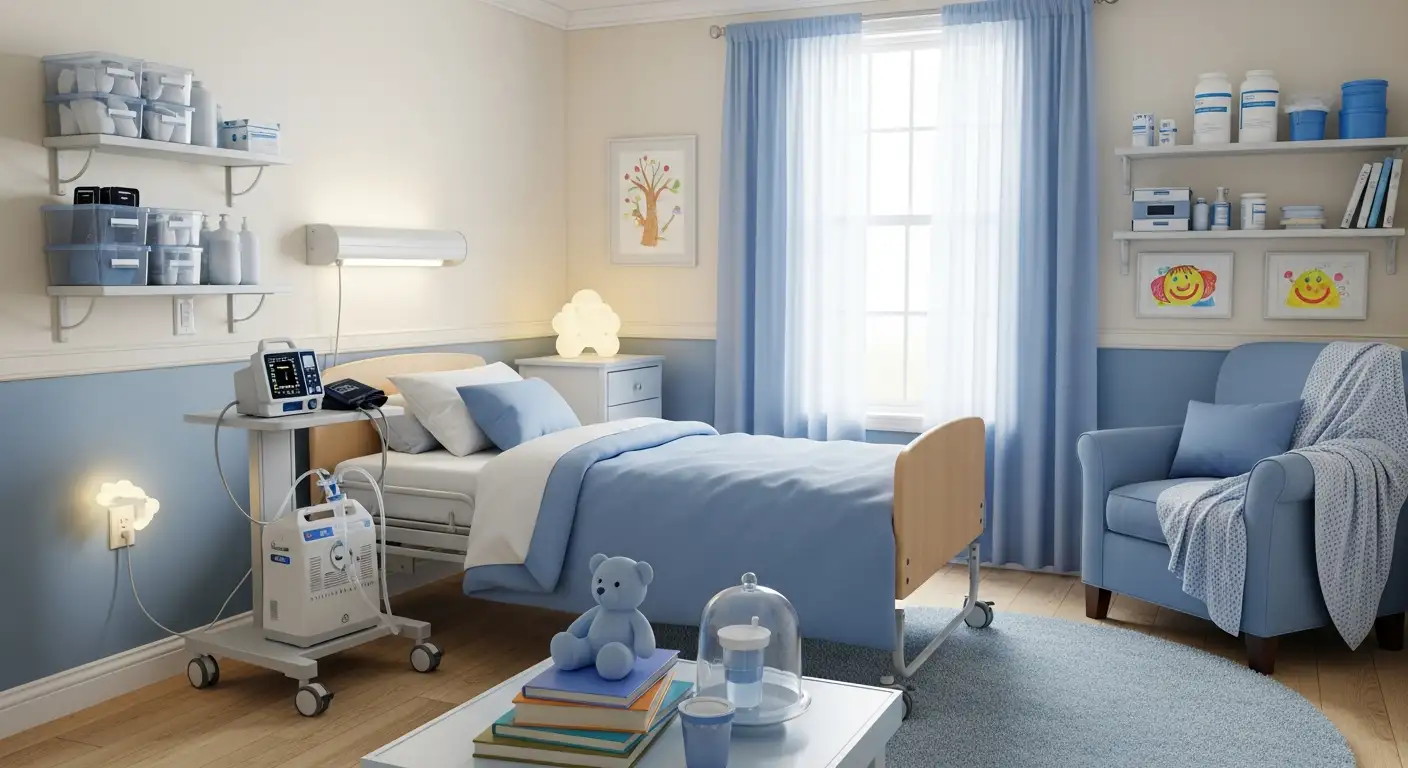Understanding the Vital Role of In-Home Pediatric Care in Behavioral Health
Pediatric home care has emerged as a crucial component in supporting early childhood behavioral therapy, offering a personalized and accessible approach to behavioral and mental health development. By integrating comprehensive services within the child's natural environment, home-based care links families, clinicians, and community resources to promote optimal developmental outcomes.
The Foundation: In-Home Pediatric Services and Early Developmental Support
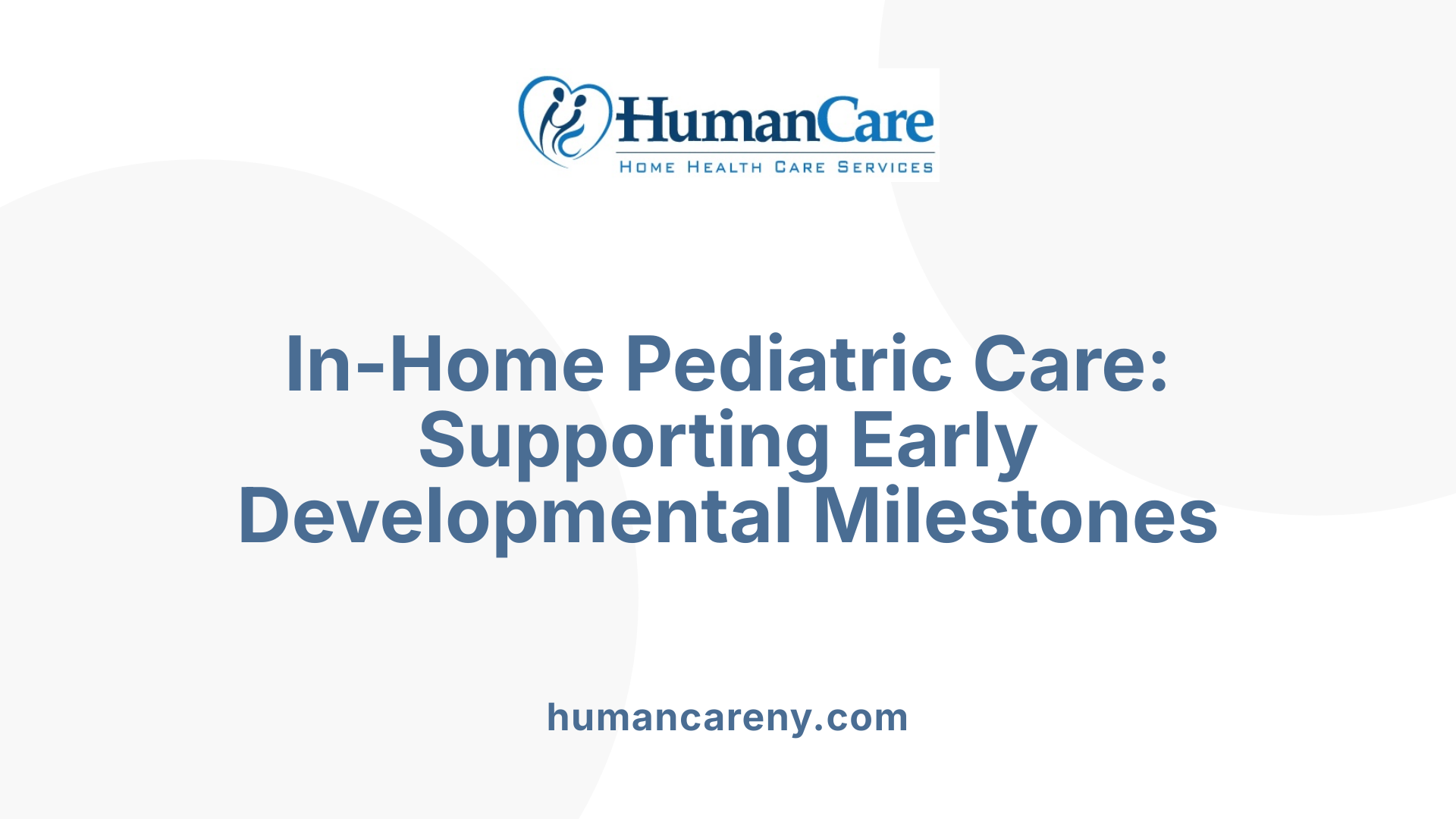
How can pediatric home care support early childhood behavioral therapy?
Pediatric home care plays a crucial role in supporting behavioral therapy for young children. Delivering services in the child's familiar environment helps reduce stress and builds trust between the child, family, and healthcare providers. In-home care allows therapists and clinicians to observe children in natural settings, which enhances their understanding of the child's behaviors and needs.
Therapists can seamlessly incorporate behavioral strategies into daily routines, such as play, meals, and bedtime, making interventions more relevant and effective. Additionally, continuous monitoring and assessment in home settings enable early detection of behavioral concerns or developmental delays. Early identification allows for timely, personalized treatment plans that promote better engagement and progress in therapy.
Supporting the child's environment through in-home therapy also encourages stronger family involvement, which is vital for sustaining positive behavioral changes over the long term. Overall, pediatric home care facilitates personalized, accessible, and trauma-informed interventions that significantly bolster early childhood behavioral therapy outcomes.
Why are in-home therapy, counseling, and assessments important for childhood behavioral development?
In-home services are essential because they provide timely, tailored support directly within the child's daily environment. These services ensure that interventions are contextually relevant and address real-life situations children face, making therapeutic efforts more meaningful and effective.
Trauma-informed approaches within the home setting help children who have experienced adversity by creating a safe space for healing and growth. Connecting therapy and assessment to the child's natural surroundings supports social-emotional skill development and helps sustain positive behavioral changes.
Moreover, in-home services often improve engagement from children and families, especially those facing barriers to accessing clinic-based care. They empower caregivers through training and support, fostering a collaborative environment for child development. Ultimately, in-home therapy and assessments are vital tools to nurture healthy behavioral and emotional development during the critical early years.
How Home-Based Services Enhance Behavioral and Mental Health Outcomes
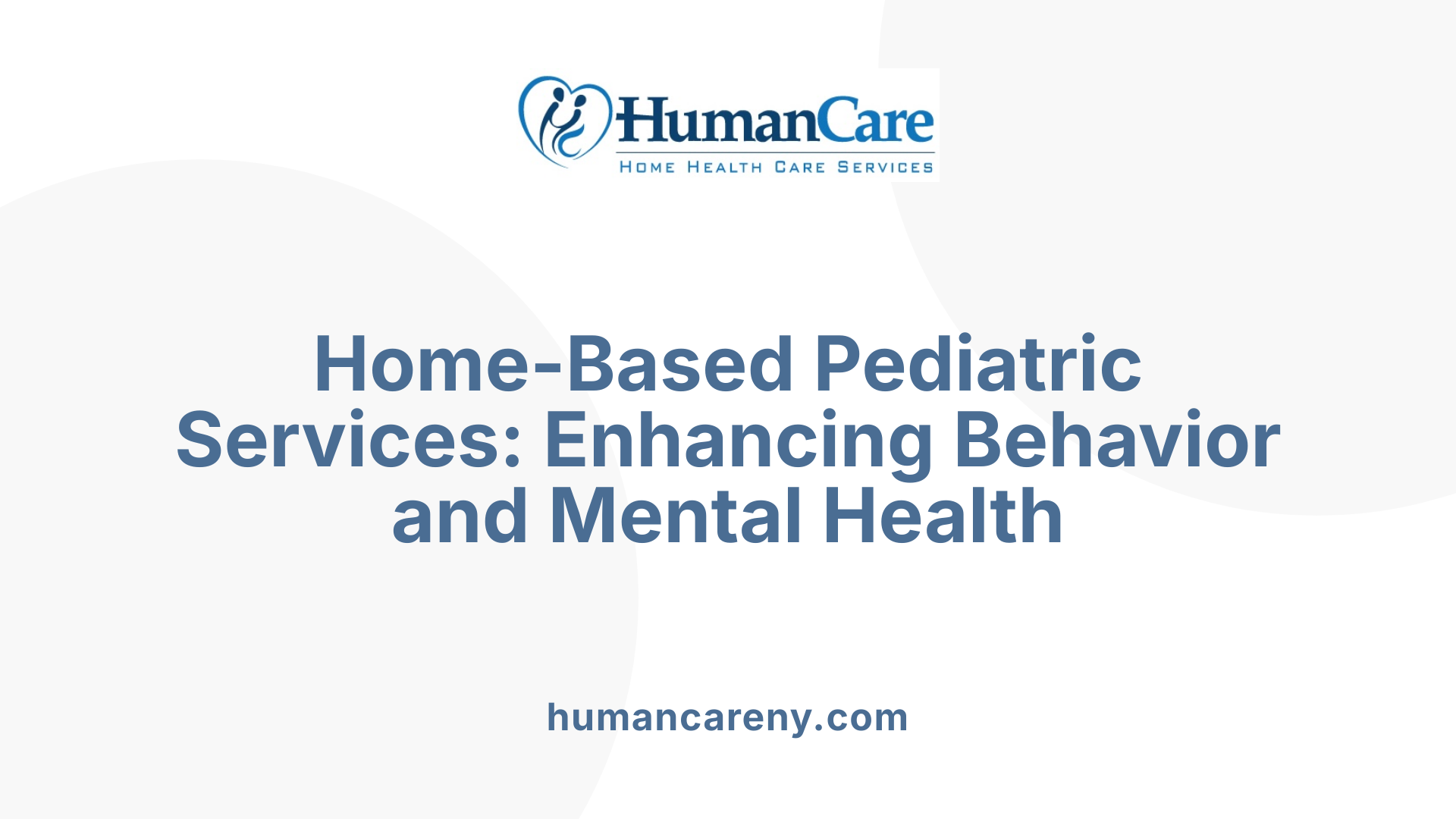
What methods are involved in delivering home-based pediatric behavioral health services?
Home-based pediatric behavioral health services employ several effective methods to support children's mental health. First, assessments such as functional behavioral assessments (FBAs) are used to understand the reasons behind specific behaviors by analyzing environmental factors and triggers. Based on these insights, providers develop individualized behavior support plans that incorporate reinforcement strategies, which motivate positive behaviors and reduce problematic ones.
These plans are not static; they are regularly monitored and adapted to the child's progress and changing needs. Collaboration between trained healthcare providers and families is vital, ensuring interventions are consistent and culturally appropriate. The use of telehealth technologies enhances access, allowing providers to deliver support remotely, conduct consultations, and provide coaching in real time. This team-based approach ensures that support is comprehensive, flexible, and tailored to each child's unique circumstances.
How do home care practices contribute to early childhood mental health support and intervention?
Home care practices play a crucial role in fostering a secure and nurturing environment — essential for early mental health development. Caregivers learn to establish routines, such as consistent mealtimes and bedtime schedules, which promote stability. Trauma-informed approaches help caregivers recognize and respond to stress or adverse experiences, providing a foundation for healing.
Furthermore, being in the child's natural environment allows providers to observe behaviors in real-life contexts, facilitating early detection of developmental delays or mental health concerns. Training caregivers in responsive interactions and behavioral strategies empowers families to support their child's emotional regulation and resilience, setting the stage for positive lifelong mental health.
Methods of pediatric behavioral health interventions at home
| Method | Description | Purpose | Additional Details |
|---|---|---|---|
| Functional Behavioral Assessments | Evaluates behavior functions through observations and interviews | Identify triggers and develop tailored strategies | Guides individualized plan development |
| Behavior Support Plans | Customized plans including reinforcement strategies and skill-building activities | Reduce challenging behaviors, promote skills | Revised regularly based on progress |
| Telehealth Consultations | Remote coaching and supervision via video platforms | Increase access, provide real-time guidance | Offers flexibility for families |
| Family Collaboration | Involving caregivers in planning, training, and feedback sessions | Ensure consistency and cultural sensitivity | Builds trust and coping skills |
| Routine and Environment Modification | Adjusting daily routines and home settings to support behavior management | Promote stability and reduce triggers | Tailored to each child's environment |
Understanding these methods helps illustrate how home-based pediatric services effectively support behavioral and mental health, promoting healthier development and resilience in young children.
Integrating Community Resources for Holistic Support
What resources and systems support early childhood behavioral health through home-based services?
A range of community-based programs and government initiatives play a crucial role in supporting early childhood mental health at home. Programs such as the North Carolina Infant-Toddler Program and California’s First 5 initiatives provide targeted services that promote social-emotional development. These include facilitated playgroups, parenting support classes, and direct mental health consultation for early care providers.
Federal and state funding sources like Medicaid's EPSDT benefit, the MHSA Prevention and Early Intervention (PEI) program, and the Oregon Early Childhood Diagnostic Crosswalk fund various mental health services. These resources make available in-home therapies, behavioral assessments, and trauma-informed care tailored to young children and their families.
Support is also extended through home visiting programs and mental health consultation services that engage caregivers directly. These services involve caregiver training, therapeutic interventions such as Child-Parent Psychotherapy, and reflective supervision to enhance the caregiver-child relationship and foster resilience.
How can community programs aid in early intervention and ongoing behavioral support?
Community programs are instrumental in facilitating early detection of behavioral issues and providing ongoing support. They incorporate regular screening and assessment — like developmental milestone tracking and social-emotional screening — which help identify concerns early.
By offering parent education, these programs empower families to adopt supportive routines and effective discipline strategies, which can prevent escalation of behavioral problems. Direct services such as in-home therapy, parent management training, and trauma-responsive interventions reinforce positive behaviors and address underlying issues.
Additionally, these programs reduce barriers to care like transportation issues or systemic inequalities, ensuring all children have access to necessary services. Integrating social-emotional learning and trauma support within existing frameworks helps sustain behavioral improvements over time, promoting healthier developmental trajectories.
| Program Type | Focus Area | Main Benefit | Funding Sources |
|---|---|---|---|
| Child-Toddler Programs | Early social-emotional skills | Early detection and intervention | State and federal grants |
| Home Visiting | Parent support and education | Strengthening caregiver capacity | Medicaid, state funds |
| Mental Health Consults | Provider and caregiver guidance | Reducing behavioral challenges | State health departments |
| Trauma Resources | Trauma-sensitive care | Healing adverse childhood experiences | Federal trauma funds |
These integrated community efforts effectively support families, ensuring children’s mental health needs are addressed proactively and comprehensively.
The Importance of Family-Centered, Trauma-Informed Care in Early Childhood Development
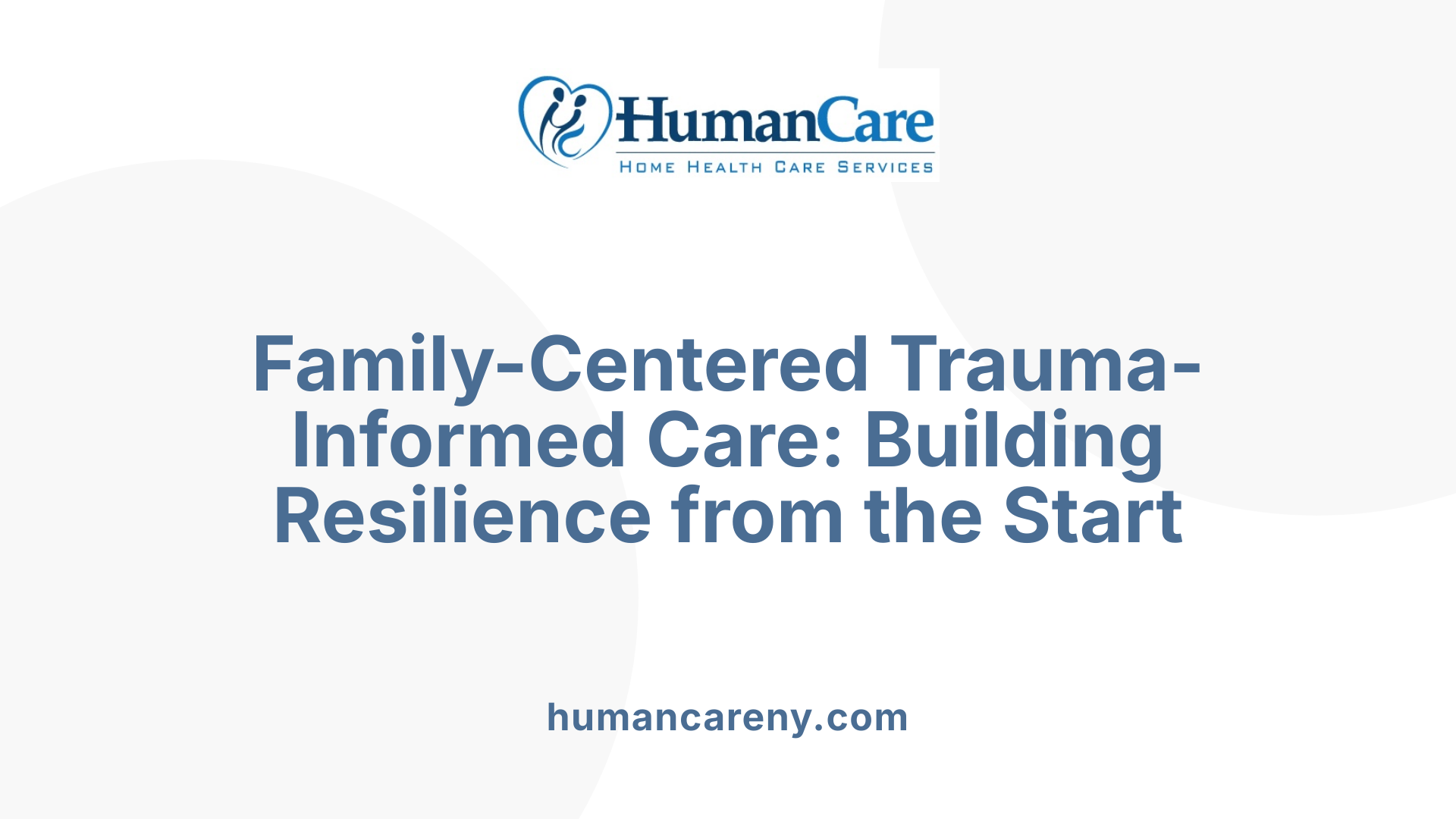
Why are in-home therapy, counseling, and assessments important for childhood behavioral development?
In-home therapy, counseling, and assessments play a critical role in promoting healthy behavioral development among young children. These services are trauma-informed and centered around the family, allowing professionals to address emotional, social, and behavioral issues within the child’s natural environment. By intervening early, providers can support social-emotional growth, improve caregiver competence, and reduce the risk of long-term adverse outcomes. For instance, therapies like Child–Parent Psychotherapy and Parent-Child Interaction Therapy involve caregivers directly, fostering stronger relationships and emotional security. This family-centered approach ensures that interventions are tailored to the child's needs while also empowering parents and caregivers to nurture resilience and stability.
How can promoting early relational health influence lifelong mental health?
Building on positive, nurturing early relationships forms the foundation for lifelong mental well-being. Early relational health includes secure attachments and responsive caregiving, which help children develop essential socioemotional skills such as empathy, self-regulation, and effective communication. These interactions strengthen the neurobiological basis for resilience, enabling children to better manage stress and adversity throughout their lives. Promoting healthy caregiver-child relationships during early childhood not only fosters immediate development but also sets the stage for enduring mental health. Evidence supports that supportive, trauma-informed interactions — reinforced through family-centered services — have a lasting impact, helping children grow into emotionally balanced and socially competent adults.
Supporting family routines and responsive caregiving
Consistent routines like shared mealtimes, reading, and outdoor activities contribute to a stable, nurturing environment. Such routines promote a sense of safety and predictability, essential for young children's emotional development. Responsive caregiving, characterized by attuned and nurturing interactions, further enhances a child's sense of security and trust. Training programs and parental support services, such as Triple P and home visiting initiatives, help families establish and maintain these routines, reducing stress and improving developmental outcomes.
Trauma-informed strategies in pediatric settings to mitigate adversity impact
Trauma-informed care in pediatric environments involves recognizing the pervasive impact of adversity and responding with sensitivity. Screening for adverse childhood experiences (ACEs), providing safe spaces, and applying practices that promote safety and trust are core components. Such strategies prevent trauma from compounding, support emotional regulation, and foster resilience — especially important for children with histories of neglect, abuse, or community violence. Integrating social and mental health services within pediatric care systems ensures early detection and intervention, promoting healthier development pathways. Overall, trauma-informed strategies help mitigate the long-term effects of early adversity, supporting children's ongoing mental health and social success.
Emerging Approaches and Technologies in Pediatric Mental Health Support
What innovative methods support early childhood behavioral therapy in home settings?
Advances in pediatric mental health care include attachment-based treatments, family-focused programs, and the integration of digital tools. Attachment-based therapies such as Child–Parent Psychotherapy focus on strengthening the emotional connection between caregivers and children, establishing a secure base for healthy development.
Home visiting models like Minding the Baby promote family engagement and reflective functioning, helping parents understand and respond to their child's needs.
Recent innovations also incorporate telehealth platforms which enable real-time counseling, coaching, and therapy sessions directly in the child's familiar environment. These methods facilitate consistent, tailored intervention that fits the family’s routine.
Contingency management strategies, offering positive reinforcement through incentives, motivate families to participate and adhere to therapy plans. Warm line consultation programs connect caregivers to trained professionals for immediate support, guidance, and problem-solving.
Why is telemedicine a valuable tool in pediatric mental health care?
Telemedicine significantly enhances access to mental health services, especially in rural or underserved communities where providers may be scarce. It helps eliminate geographic barriers, ensuring children and families receive timely support.
Through telehealth, caregivers can receive expert coaching during daily routines, making interventions more practical and integrated into everyday life. This real-time support improves engagement and adherence to therapeutic strategies.
Moreover, telehealth services help maintain continuity of care during crises such as the COVID-19 pandemic, allowing ongoing therapy without risking health or transportation issues.
In summary, these innovative methods—attachment-based treatments, telehealth, and contingency management—are transforming early childhood behavioral therapy by making it more accessible, engaging, and responsive to family needs.
| Method | Description | Benefits |
|---|---|---|
| Attachment-based treatments | Focus on strengthening caregiver-child relationships | Promote emotional security and resilience |
| Telehealth platforms | Online therapy, coaching, and assessments | Improve access, convenience, and real-time support |
| Contingency management strategies | Use of incentives to reinforce positive behaviors | Encourage participation and sustain engagement |
| Warm line consultations | Immediate support lines for caregivers | Reduce stress, prevent crises, and build confidence |
This integrated approach supports early behavioral needs, enhances family involvement, and leverages technology to improve outcomes for young children.
Supporting Lifelong Well-Being Through Early Intervention and Continuous Support
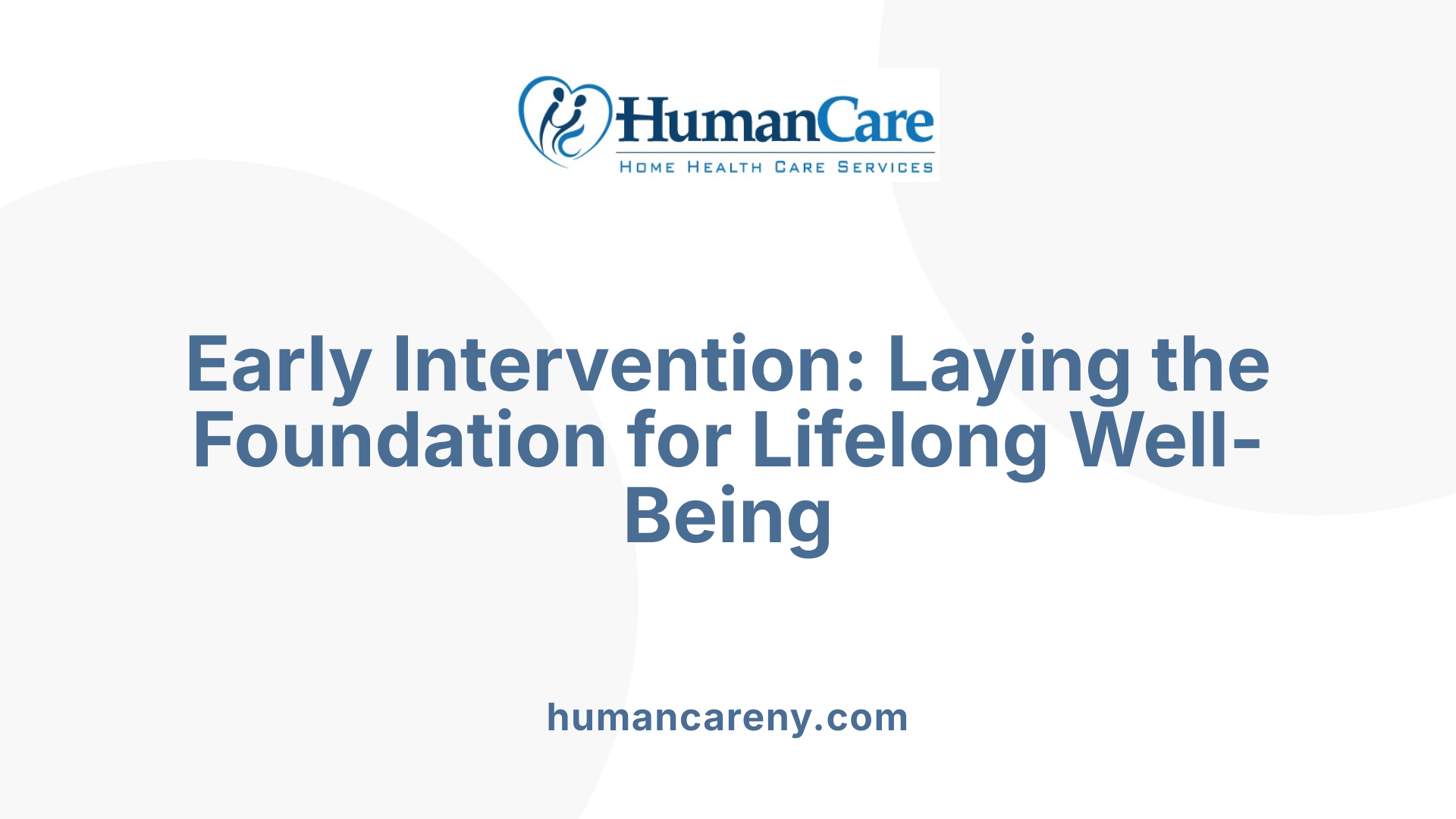
How can pediatric home care improve developmental and behavioral outcomes for young children?
Pediatric home care offers tailored, ongoing support within a child's natural environment, which is crucial for early childhood development. Care providers work alongside families to implement therapies like speech, occupational, and behavioral interventions directly in the home setting. This personalized approach not only enhances the child's comfort and willingness to participate but also allows for real-time adjustments that meet their specific needs. With consistent involvement, caregivers gain valuable training and resources, fostering a stable, nurturing environment that promotes social-emotional, cognitive, and physical growth. Such early, family-centered care is instrumental in improving developmental and behavioral outcomes, reducing the risk of future mental health challenges.
Why is early and appropriate psychological therapy crucial in childhood development?
Addressing mental health concerns promptly through psychological therapy is vital for healthy childhood development. Early intervention helps manage behavioral issues, anxiety, and trauma before they worsen, forming a strong foundation for resilient emotional regulation. The therapies, including play and trauma-informed approaches, engage children effectively and facilitate better parent-child relationships. When families receive guidance and support early on, children are more likely to develop essential social skills and positive coping strategies. Ultimately, early psychological care prevents the escalation of problems, supports lifelong mental health, and reduces long-term societal and medical costs.
How do systems-based approaches sustain mental health improvements?
Creating integrated, multidisciplinary systems that include primary care, mental health services, and community supports ensures continuous access to care. These models enable early detection, coordinated treatment, and family involvement, which are critical for sustained mental health. Incorporating trauma-informed and relationship-based interventions—such as dyadic treatments and home visiting programs—further strengthens early caregiving relationships. State and federal policies, like Medicaid expansion and early childhood mental health initiatives, expand access and funding, making these services more available and effective. Such comprehensive systems foster resilience and promote ongoing well-being from infancy through adulthood.
| Aspect | Focus | Impact |
|---|---|---|
| Prevention | Early screening and intervention | Reduces escalation and long-term issues |
| Social-Emotional Skills | Resilience, emotional regulation | Builds a foundation for healthy relationships |
| System-Based Approaches | Integrated care models | Ensures ongoing, coordinated support |
| Policies & Funding | State and federal investments | Expands access and sustains programs |
The combined efforts of early, personalized services, timely therapy, and supportive policies create a supportive environment that nurtures lifelong mental and emotional health, setting children on a path toward well-being and resilience.
Fostering a Supportive Environment for Lifelong Mental Health
Pediatric home care plays an indispensable role in early childhood behavioral therapy by providing tailored, accessible, and trauma-informed support within the child's natural environment. Through integrating community resources, empowering families, and leveraging innovative technologies, these services are shaping a future where every child has the opportunity to thrive emotionally, socially, and cognitively.
References
- How In-Home Pediatric Services Can Boost Your Child's Development
- Integrated Behavioral Health for Preschool Children in Pediatric ...
- The Family is the Patient: Promoting Early Childhood Mental Health ...
- At-Home Pediatric Care: Managing Children with Special Needs
- Addressing infant and early childhood mental health needs
- Treating Children's Mental Health with Therapy - CDC
- Early Childhood Mental Health Consultation | Colorado Department ...

